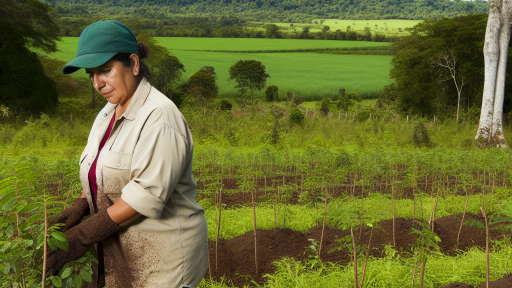Understanding the Basics of Sustainable Supply Chains in Agribusiness
Defining Sustainable Supply Chains
Sustainable supply chains prioritize environmental health and social responsibility.
They aim to minimize waste and reduce carbon footprints.
This approach supports the integrity of the ecosystem.
Furthermore, it aims to ensure fair labor practices throughout the supply chain.
Importance of Sustainability in Agribusiness
Sustainability in agribusiness is crucial for meeting global food demands.
Consumers increasingly prefer products that are environmentally friendly.
Adopting sustainable practices helps businesses build customer loyalty.
Additionally, it can lead to improved operational efficiency.
Key Components of Sustainable Supply Chains
Transparency is vital in sustainable supply chains.
Companies must track sourcing and production processes.
Collaboration among stakeholders enhances sustainability efforts.
Technology plays a significant role in promoting sustainability.
- Data analytics helps in monitoring sustainability metrics.
- Blockchain technology ensures traceability.
- Automation can reduce waste and improve efficiency.
Challenges in Implementing Sustainable Supply Chains
Transitioning to sustainable supply chains can be challenging for many agribusinesses.
High initial costs often deter businesses from changing practices.
Additionally, there is often a lack of knowledge about sustainable methods.
Transform Your Agribusiness
Unlock your farm's potential with expert advice tailored to your needs. Get actionable steps that drive real results.
Get StartedResistance to change is another significant barrier.
Case Studies of Successful Sustainable Supply Chains
Companies like GreenHarvest have implemented sustainable practices effectively.
They emphasize organic farming and reduce chemical usage significantly.
Similarly, PureEarth focuses on fair trade and promotes local farming.
- These companies demonstrate the viability of sustainable practices.
- They show that sustainability can coexist with profitability.
Key Principles of Sustainable Agriculture and Their Impact on Supply Chains
Understanding Sustainability in Agriculture
Sustainable agriculture focuses on environmentally friendly practices.
This approach encourages preserving resources for future generations.
It seeks to balance the economic, social, and environmental aspects of farming.
Moreover, it promotes the use of renewable resources.
Transitioning to sustainable methods can enhance soil health.
Adoption of Eco-Friendly Practices
Farmers increasingly use crop rotation to maintain soil fertility.
Cover cropping improves soil structure and reduces erosion.
This method also helps control pests naturally.
Additionally, integrated pest management minimizes chemical exposure.
Such practices lead to a more resilient food supply.
Impact on Supply Chain Dynamics
Sustainable principles influence sourcing decisions significantly.
Companies seek suppliers committed to eco-friendly practices.
This fosters collaboration throughout the supply chain.
Furthermore, implementing sustainability can reduce overall costs.
Companies benefit from increased efficiency and reduced waste.
Consumer Demand for Sustainability
Consumers are increasingly aware of their purchasing choices.
This awareness drives demand for sustainably produced goods.
As a result, companies must adapt to meet these preferences.
Transparency about sourcing and production practices is vital.
Effective communication can enhance brand loyalty and trust.
Showcase Your Farming Business
Publish your professional farming services profile on our blog for a one-time fee of $200 and reach a dedicated audience of farmers and agribusiness owners.
Publish Your ProfileRegulatory Influences
Governments play a crucial role in promoting sustainable agriculture.
Through regulations, they encourage eco-friendly practices.
These regulations often set standards for sustainability reporting.
Compliance with these standards can benefit businesses strategically.
Ultimately, regulations may influence supply chain management approaches.
Assessing Current Supply Chain Practices in Modern Agribusiness
Overview of Current Supply Chains
Modern agribusiness relies on complex supply chains.
These chains encompass various stages, including production, processing, and distribution.
Each stage involves multiple stakeholders, from farmers to retailers.
Collaboration among these stakeholders is essential for efficiency.
Identifying Inefficiencies
Despite advancements, inefficiencies persist in agribusiness supply chains.
Delays in transportation often lead to increased costs.
Additionally, a lack of real-time data hinders decision-making.
Outdated processes can waste resources and time.
Embracing Technology for Improvement
Technology plays a vital role in enhancing supply chain practices.
Automation can streamline processes and reduce human error.
Data analytics provide valuable insights into supply chain performance.
Moreover, blockchain technology enhances transparency and traceability.
Evaluating Sustainability Practices
Sustainability is becoming a key focus in supply chain assessments.
Many companies prioritize sustainable sourcing and production methods.
Implementing eco-friendly practices can significantly reduce carbon footprints.
Transparency in sourcing helps build consumer trust.
Notes on Regulatory Compliance
Compliance with regulations is crucial in agribusiness supply chains.
Regulations often vary by region and product type.
Non-compliance can result in financial penalties and reputational damage.
Staying informed about regulatory changes is essential for companies.
See Related Content: Value-Added Products to Increase Farm Revenue Streams
Innovative Technologies for Enhancing Sustainability in Supply Chains
Introduction to Technological Advancements
Technology plays a crucial role in building sustainable supply chains.
Innovative solutions help agribusinesses optimize operations.
They create efficiencies that reduce waste and emissions.
Precision Agriculture
Precision agriculture employs data-driven approaches for better resource management.
This technique uses GPS and IoT devices to monitor crop health.
Farmers gain insights into soil nutrients and water requirements.
Consequently, they apply inputs more effectively, minimizing excess use.
This method significantly lowers environmental impact.
Benefits of Precision Agriculture
- Reduces use of fertilizers and pesticides.
- Enhances crop yields through targeted interventions.
- Improves water conservation efforts.
Blockchain for Transparency
Blockchain technology ensures transparency in the supply chain.
This decentralized ledger tracks products from farm to consumer.
With blockchain, each transaction is recorded securely.
Such transparency fosters trust in the food supply.
It also helps in identifying and removing inefficiencies.
Enhancing Traceability
- Consumers can trace product origin and quality.
- Producers can quickly identify sources of contamination.
- Retailers gain insights into supply chain bottlenecks.
Artificial Intelligence in Logistics
Artificial Intelligence (AI) optimizes logistics management.
Showcase Your Farming Business
Publish your professional farming services profile on our blog for a one-time fee of $200 and reach a dedicated audience of farmers and agribusiness owners.
Publish Your ProfileAI algorithms analyze data to enhance supply chain efficiency.
They forecast demand accurately, ensuring timely deliveries.
By utilizing AI, businesses can reduce transportation costs.
This reduction directly contributes to sustainability goals.
AI Impact on Supply Chain Management
- Improves inventory management practices.
- Reduces food waste through better demand forecasting.
- Enhances decision-making with real-time data analysis.
Future Directions in Sustainable Agriculture
Integrating these innovative technologies fosters sustainable supply chains.
As agribusiness continues to evolve, technology will drive change.
Ultimately, the future of sustainable agriculture depends on these advancements.
Delve into the Subject: Designing Seasonal Farm Events To Attract Agritourism Visitors
Best Practices for Sourcing Sustainable Agricultural Products
Understanding Sustainable Sourcing
Sustainable sourcing involves selecting products that do not harm the environment.
This practice promotes the use of renewable resources and ethical labor.
It also prioritizes the welfare of workers and local communities.
Engaging Stakeholders
Communicate with stakeholders to understand their needs and perspectives.
Farmers, suppliers, and consumers play vital roles in this process.
Building partnerships ensures a shared commitment to sustainability.
Adopting Certification Standards
Use recognized certifications to guide sourcing decisions.
- Look for labels like Fair Trade and Organic.
- These certifications demonstrate compliance with sustainable practices.
- They enhance trust among consumers and businesses alike.
Implementing Traceability Systems
Ensure all products have a clear traceability path.
This transparency helps track where and how products are sourced.
It builds consumer confidence in product integrity.
Measuring Environmental Impact
Evaluate the environmental impact of sourcing decisions.
Assess resources used such as water, energy, and land.
Continually strive to minimize negative impacts on ecosystems.
Investing in Technology
Utilize technology to optimize sourcing processes.
Advanced data analytics improve decision-making related to sustainability.
Additionally, technology enhances supply chain efficiencies.
Promoting Local Sourcing
Support local farmers and businesses whenever possible.
This practice reduces transportation emissions and boosts local economies.
Furthermore, it fosters connections within communities.
Discover More: Diversification Through Specialty Crop Production

The Role of Collaboration and Partnerships in Creating Sustainable Supply Chains
Importance of Collaboration
Collaboration is essential for building sustainable supply chains in agribusiness.
It fosters innovation and boosts efficiency across different sectors.
Partnerships bring diverse expertise to the table.
As a result, stakeholders can craft practical solutions for sustainability.
Building Strategic Partnerships
Strategic partnerships enhance resource sharing among stakeholders.
Companies can pool their resources to implement sustainable practices effectively.
For example, farmers can collaborate with tech firms for precision agriculture.
This combination optimizes productivity and minimizes waste.
Engaging with Local Communities
Engagement with local communities strengthens supply chain sustainability.
Communities provide essential insights into environmental and social challenges.
Additionally, local partnerships contribute to shared values and goals.
As a result, businesses can align their practices with community needs.
Showcase Your Farming Business
Publish your professional farming services profile on our blog for a one-time fee of $200 and reach a dedicated audience of farmers and agribusiness owners.
Publish Your ProfileLeveraging Technology for Collaboration
Technology plays a vital role in enhancing collaborative efforts.
Digital platforms facilitate real-time data sharing among stakeholders.
This transparency boosts trust and accountability across the supply chain.
Moreover, data analytics help identify areas for improvement.
Case Studies of Successful Partnerships
Successful partnerships provide valuable lessons for agribusiness.
For instance, a collaboration between GreenFarm Co. and EcoTech led to reduced carbon footprints.
They achieved this through joint initiatives in sustainable farming practices.
Similarly, FreshHarvest partnered with local farmers to promote organic produce.
This initiative enhanced market access while supporting local economies.
Addressing Challenges Together
Collaborative efforts help tackle challenges in the supply chain.
For instance, fluctuations in demand require a united response from all stakeholders.
Through partnership, businesses can develop contingency plans more effectively.
This proactive approach mitigates risks associated with market volatility.
Future Directions for Sustainable Supply Chains
The future of agribusiness relies on strong collaboration and partnerships.
As sustainability becomes a priority, stakeholders must adapt and cooperate.
Investing in relationships can pave the way for innovative solutions.
Ultimately, a sustainable supply chain boosts resilience and profitability.
Delve into the Subject: Implementing Sustainable Practices In Agritourism Operations
Regulatory Requirements and Certifications for Sustainable Practices
Importance of Compliance
Compliance with regulatory standards is essential for sustainable agribusiness.
It ensures businesses operate within legal frameworks.
Moreover, adherence builds consumer trust and fosters brand loyalty.
Regulatory compliance also encourages better environmental practices.
Key Regulatory Frameworks
Many countries enforce regulations that govern agricultural practices.
In the United States, the Environmental Protection Agency oversees agricultural chemicals.
Similarly, the European Union enacts policies aimed at sustainable farming.
These frameworks address pesticide use, soil management, and water resources.
Certification Programs
Certifications play a vital role in promoting sustainable practices.
They validate compliance with specific sustainability criteria.
For instance, organic certification guarantees adherence to organic farming standards.
Similarly, Fair Trade certification ensures ethical treatment of farmers.
Popular Certification Options
- USDA Organic Certification
- Global GAP
- Rainforest Alliance Certified
- Fair Trade Certified
Benefits of Certification
Certifications offer numerous benefits for agribusinesses.
They improve market access for sustainable products.
Additionally, they can lead to premium pricing opportunities.
Certification also enhances brand reputation, attracting environmentally-conscious consumers.
Challenges in Certification
Despite the benefits, obtaining certifications presents challenges.
Documentation requirements can be extensive and time-consuming.
Additionally, maintaining compliance often incurs extra costs.
Moreover, farmers may struggle with the complexity of certification processes.
Strategies for Overcoming Challenges
- Invest in training for farmers on sustainable practices.
- Partner with organizations for guidance on certification processes.
- Utilize technology to streamline documentation.
Future Trends in Sustainability Regulations
Regulatory environments continue to evolve toward sustainability.
Governments are increasingly incorporating climate change policies.
Showcase Your Farming Business
Publish your professional farming services profile on our blog for a one-time fee of $200 and reach a dedicated audience of farmers and agribusiness owners.
Publish Your ProfileFuture regulations may demand higher sustainability standards.
Staying informed will be crucial for agribusinesses aiming for compliance.
Measuring and Monitoring the Sustainability of Supply Chain Operations
Defining Key Performance Indicators
Establish clear metrics to gauge sustainability efforts.
These indicators can vary by business and sector.
Common examples include carbon footprint and waste generation.
Identify relevant indicators specific to agribusiness.
Regularly reassess these indicators for effectiveness.
Utilizing Technology for Improved Tracking
Implement technology to enhance supply chain monitoring.
Tools like IoT sensors can provide real-time data.
Blockchain technology ensures transparency and traceability.
Cloud-based software facilitates data sharing across teams.
Adopting these technologies improves decision-making.
Conducting Regular Audits
Schedule frequent audits to evaluate sustainability practices.
Incorporate both internal and external assessments.
Utilize third-party auditors for impartial evaluations.
Audits help identify areas needing improvement.
They also ensure compliance with industry standards.
Engaging Stakeholders
Involve stakeholders in sustainability discussions.
Gather input from employees, suppliers, and customers.
This collaboration fosters a collective commitment to sustainability.
Regular stakeholder feedback enriches strategy adjustments.
Ultimately, it enhances accountability throughout the supply chain.
Reporting and Transparency
Create regular sustainability reports to share progress.
These reports should detail goals, actions, and outcomes.
Transparency builds trust with consumers and stakeholders alike.
Utilize clear language and visuals to enhance understanding.
Consider digital platforms for broader outreach.
Additional Resources
AEEC-AGRICULTURAL ECON/ECON | New Mexico State University …
USDA Agri-Food Supply Chain Assessment: Program and Policy …




